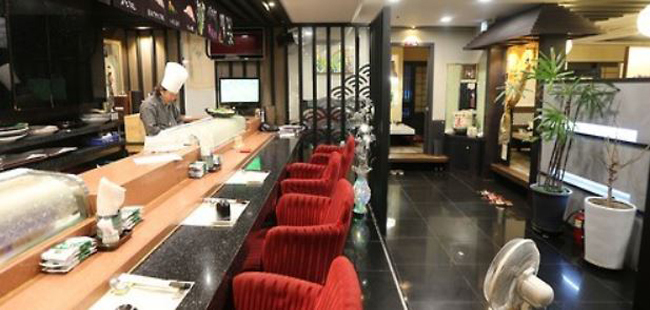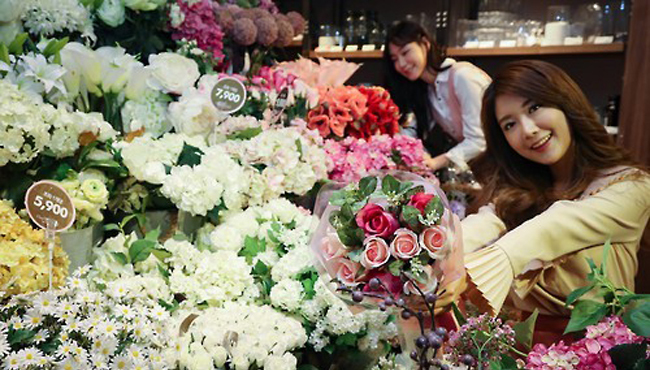Anti-graft law deals blow to upscale restaurants, flower businesses
By YonhapPublished : Sept. 24, 2017 - 10:10
Sales at upscale Korean restaurants and flower businesses fell in the past year, data showed Sunday, a decline widely blamed on South Korea's anti-graft law.
Credit-card spending by corporate users in high-end restaurants specializing in traditional Korean cuisine dropped 25.2 percent in the period October 2016 to August 2017, compared with the same period a year earlier, according to data compiled by BC Card Co., a leading credit card issuer in South Korea.
The decline is believed to have been affected by the anti-graft law that sets 30,000 won ($26) as the maximum value of meals that government officials, journalists and private school teachers can be treated to.
The maximum value of gifts a person subject to the rules can receive is set at 50,000 won under the law -- which took effect in September last year. Cash gifts for events such as weddings and funerals have been fixed at no more than 100,000 won.
Credit-card spending by corporate users in high-end restaurants specializing in traditional Korean cuisine dropped 25.2 percent in the period October 2016 to August 2017, compared with the same period a year earlier, according to data compiled by BC Card Co., a leading credit card issuer in South Korea.
The decline is believed to have been affected by the anti-graft law that sets 30,000 won ($26) as the maximum value of meals that government officials, journalists and private school teachers can be treated to.
The maximum value of gifts a person subject to the rules can receive is set at 50,000 won under the law -- which took effect in September last year. Cash gifts for events such as weddings and funerals have been fixed at no more than 100,000 won.

The law is meant to, among other things, curb the deep-rooted tradition of excessive hospitality and root out bribery.
A survey released by the Korea Foodservice Industry Research Institute showed that 66.2 percent of 420 restaurants saw their sales decline after the anti-graft law went into effect last year. On average, their sales fell by 22.2 percent.
Credit-card spending by corporate users in flower shops declined 8.5 percent between October 2016 and August 2017, compared with the previous twelve months, according to the data.
In South Korea, potted orchids have long been used as gifts for those who receive promotions, but the practice has been affected by the law.

In 2016, then-President Park Geun-hye sent potted orchids via an aide to key lawmakers of the ruling and opposition parties to congratulate them on their new posts.
The anti-graft law has also dealt a severe blow to sales of gift sets of Korean beef, fruit and red ginseng.
Sales of packaged gift sets of agricultural and livestock products during Lunar New Year in 2017 came to 124.2 billion won, down 25.8 percent from a year earlier. Lunar New Year is one of the most widely celebrated holidays in South Korea.
Analysts said sales of agricultural and livestock products could drop in the upcoming Chuseok holiday, South Korea's autumn harvest celebration -- the equivalent to Thanksgiving Day in the United States -- which falls in early October this year. (Yonhap)







![[Graphic News] More Koreans say they plan long-distance trips this year](http://res.heraldm.com/phpwas/restmb_idxmake.php?idx=644&simg=/content/image/2024/04/17/20240417050828_0.gif&u=)
![[KH Explains] Hyundai's full hybrid edge to pay off amid slow transition to pure EVs](http://res.heraldm.com/phpwas/restmb_idxmake.php?idx=644&simg=/content/image/2024/04/18/20240418050645_0.jpg&u=20240419100350)






![[From the Scene] Monks, Buddhists hail return of remains of Buddhas](http://res.heraldm.com/phpwas/restmb_idxmake.php?idx=652&simg=/content/image/2024/04/19/20240419050617_0.jpg&u=20240419175937)

![[KH Explains] Hyundai's full hybrid edge to pay off amid slow transition to pure EVs](http://res.heraldm.com/phpwas/restmb_idxmake.php?idx=652&simg=/content/image/2024/04/18/20240418050645_0.jpg&u=20240419100350)

![[Today’s K-pop] Illit drops debut single remix](http://res.heraldm.com/phpwas/restmb_idxmake.php?idx=642&simg=/content/image/2024/04/19/20240419050612_0.jpg&u=)